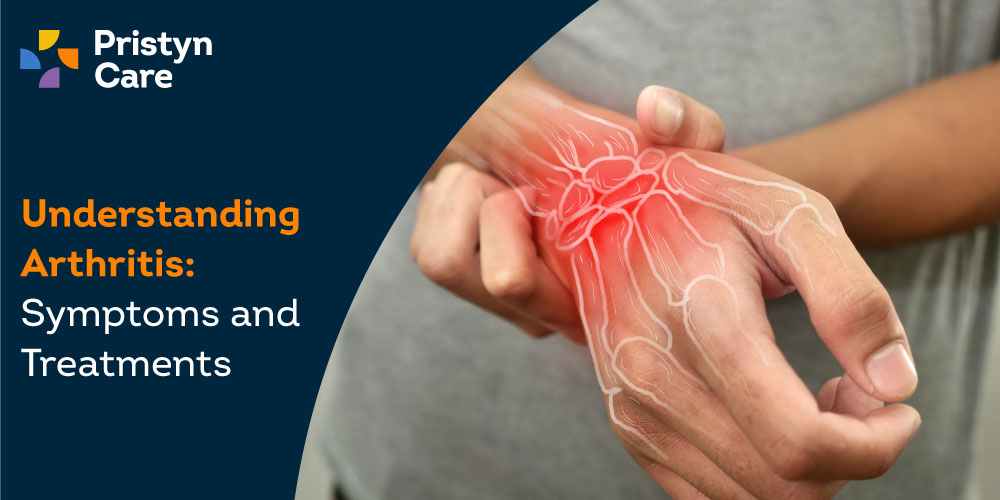
Arthritis is swelling and tenderness of the joints of the body, including the knee, hips, shoulders, hands, wrists, lower back, etc. There are many risk factors for arthritis, such as tobacco consumption, family history, and other health conditions. Arthritis can affect any age group, but it is commonly seen in people older than 50.
There are different types of treatment options for arthritis such as medication, physiotherapy, surgery, etc. A doctor first diagnoses the condition and asks about the symptoms that you are experiencing to understand the severity of the condition. Read on to learn more about arthritis, its symptoms, and treatment options.
Symptoms of Arthritis
The symptoms of arthritis depend on multiple factors, such as the severity of the condition and the age of the patient. Some common symptoms of arthritis are as follows
- Neck pain: Arthritis causes neck pain and stiffness that usually worsens with upright activities. It spasms the muscles in the neck or shoulders and can affect the neck’s range of motion.
- Knee pain: Arthritis affects the knee joint and causes pain, stiffness, and swelling in your joints.
- Loss of balance: Arthritis damages the knee and hips, which can affect balance and mobility and increase the risk of falling, making you more likely to fracture a bone.
- Inflammation: In arthritis, the body’s immune system attacks the lining of the joint capsule, which leads to inflammation. Inflammation is characterized by redness, swollen joints, joint pain, stiffness, loss of joint function, etc.
- Numbness and tingling: Arthritis can spread to surrounding nerves and lead to joint inflammation, nerve damage, numbness, and tingling sensations.
- Shoulder pain: Arthritis causes inflammation in the shoulder joint, and over time, it leads to cartilage loss. It starts causing shoulder pain, stiffness, decreased range of motion, and a popping, clicking sound in the shoulder joint.
- Back pain: Arthritis usually affects the lower back and develops through wear and tear. As the cartilage between the joints slowly breaks down, it leads to pain and inflammation.
- Headache: If arthritis causes damage at the top of the spine, in your first, second, or third vertebrae, then it may cause headaches. The sensitive nerves of your spine connect your scalp to the top areas of your spine, so if vertebrae deteriorate, you can have headaches and pain in your neck, head, or jaw.
How is Arthritis Diagnosed?
If you experience stiffness, swelling, joint pain, and decreased range of motion, then you must contact your healthcare provider and undergo a detailed diagnosis to understand the condition. Here are some standard diagnostic tests that doctor recommends to confirm the arthritis:
- Bone scan
- MRI scan (Magnetic resonance imaging)
- CT scan
Arthritis Treatment
Treatment approaches for arthritis depend on the severity of the condition. If the pain is mild and does not limit your motion, then non-surgical treatment options can help. However, if the symptoms affect your range of motion and your day-to-day activities, then surgical intervention may be required. Some common treatment options for arthritis are as follows:
- Lifestyle changes: A doctor may recommend some lifestyle changes, such as avoiding over-stretching of joints, avoiding junk food, and maintaining a healthy diet to protect your joints and slow the progress of the disease.
- Exercise: Exercising regularly provides strength to the muscles that support joints and reduce stiffness. You can do aerobic exercises that are easy on joints such as walking, swimming, bicycling, etc. These exercises improve joint function and mobility.
- Weight loss: Being obese or overweight is one of the risk factors for arthritis. Weight loss eases arthritis pain and improves the quality of life. Excess body weight puts pressure on the knee and leads to arthritis. Therefore, it is crucial to maintain a healthy weight to reduce the risk of arthritis.
- Physical therapy: It is one of the effective ways to treat arthritis. Physiotherapy helps improve joints and provides strength to the muscles. It involves hot/cold pack application, electrical stimulation, hydrotherapy, etc.
- Medications: Medications can help relieve pain and reduce inflammation associated with arthritis. Some common medications include acetaminophen, nonsteroidal anti-inflammatory medicines, and drugs like aspirin and ibuprofen to reduce both pain and swelling.
- Steroid injections: They are usually recommended for people with rheumatoid arthritis and other types of inflammatory arthritis. A steroid injection can either be inserted directly into the inflamed joint, into the soft tissue, or into the muscle, depending on the condition.
- Disease-modifying anti-rheumatic drugs: A doctor usually recommends these drugs to slow the progression of rheumatoid arthritis. These drugs include methotrexate, sulfasalazine, etc. They help in stopping the immune system from destroying the joints.
- Surgery: Surgery is recommended in severe cases when the pain worsens and causes disability. Some standard surgical procedures are as follows:
- Osteotomy: In this surgical procedure, a surgeon cuts and realigns the bones that make up a joint.
- Synovectomy: During this surgery, a diseased and damaged joint lining caused by rheumatoid arthritis is removed to reduce pain and swelling.
- Fusion: In this surgery, the ends of the bones are fused together to relieve pain and prevent joint motion.
- Joint replacement: This surgery involves removing the damaged joint and replacing it with an artificial implant.
Arthritis is an extremely common condition, and each patient experiences the disease uniquely. It causes various painful symptoms, limits motion, and can impact the quality of life. If you are experiencing arthritis symptoms, then it is crucial to consult a doctor and seek treatment help. Moreover, it is also essential to maintain a healthy weight and follow a healthy diet to reduce the chances of arthritis. Contact







